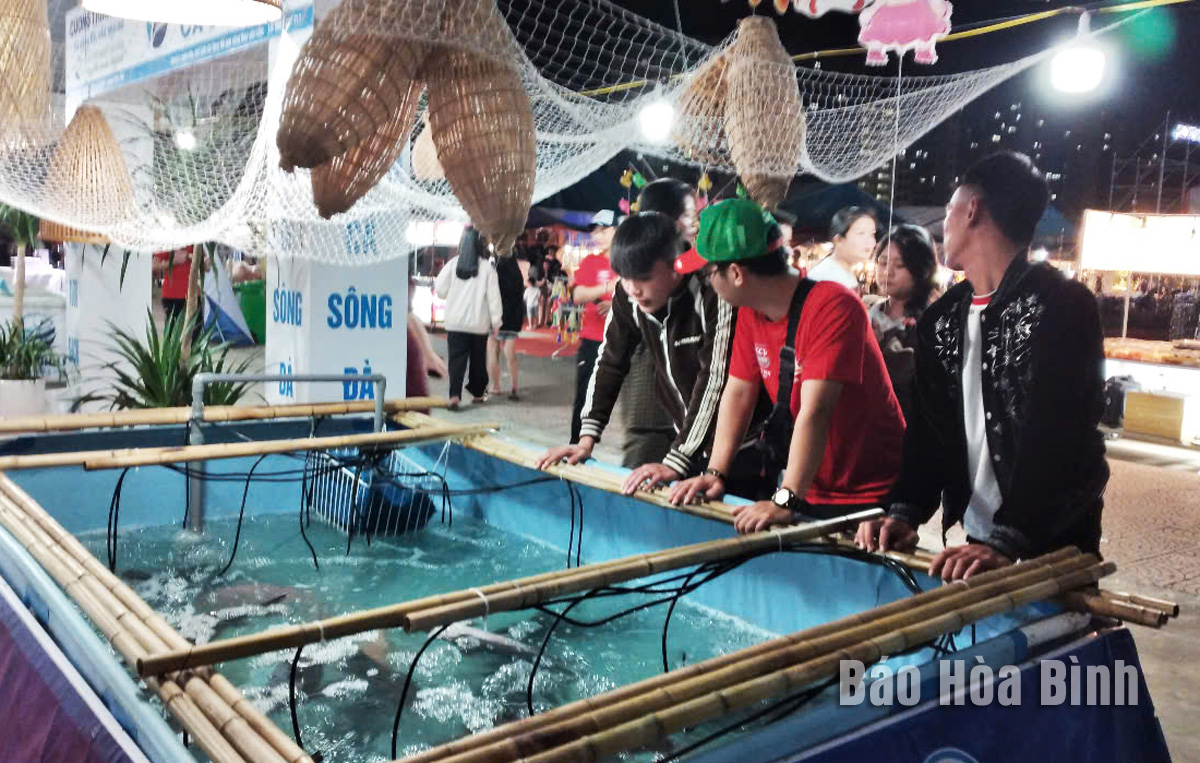
As part of the opening ceremony of the 2024 Hoa Binh Province Da River Fish and Shrimp Festival, the auction of specialty fish from the Hoa Binh reservoir attracted significant attention.
Specialty fish at the ceremony of the 2024 Hoa Binh Province Da River Fish and Shrimp Festival.
Thousands of attendees cheered as bidders
competed for prized catches. A commercial sturgeon weighing over 45 kg from Hai
Dang Aquaculture Co., Ltd. fetched a final price of 150 million VND (60 USD),
while a 25-kg black carp from Cuong Thinh Aquaculture and Services Co., Ltd.
was sold for 105 million VND. Both fish were raised in the Hoa Binh reservoir,
known for its high-quality aquatic products that meet the standards of even the
most discerning consumers.
This marks the second year the festival has been
held at a provincial level, aiming to enhance the value of aquaculture and
develop signature tourism products for Hoa Binh. The opening night drew
thousands of residents and tourists to the province's Exhibition and Trade
Center for shopping, entertainment, and experiences.
Hai Dang Aquaculture Co., Ltd., with over 20
years of aquaculture experience in the Hoa Binh reservoir, showcased its live
specialty fish and shrimp, alongside a variety of processed products. Many of
these items meet 3-star and 4-star OCOP standards.
Recognising the potential of integrating cage
fish farming with tourism, the company has expanded its hands into eco-tourism
services, offering restaurants, accommodations, and professional guided boat
tours. Their efforts aim to attract both domestic and international visitors to
the region, often referred to as the "Halong Bay of the mountains".
The Hoa Binh reservoir area has significant
potential for developing aquaculture alongside eco-tourism, community tourism,
and leisure activities, according to the Department of Agriculture and Rural
Development. The province currently maintains 2,695 hectares of fish farming in
reservoirs and 4,987 fish cages, with an estimated 2024 aquaculture production
of 12,500 tonnes. Fish cage farming on the Da River has become a major
contributor to the agricultural sector's growth.
Efforts to align aquaculture with eco-tourism
are part of a broader initiative to establish the Hoa Binh reservoir as a
National Tourism Area, per Resolution 14-NQ/TU. Presently, the area boasts over
100 lodging facilities employing 1,200 workers, and approximately 300 tourist
transport vehicles. An interconnected network of restaurants, tourist sites,
and lake experiences has created a diverse tourism ecosystem, increasingly
appealing to visitors.
These developments highlight promising
opportunities for local authorities and communities to expand cage fish farming
and tourism, positioning the Hoa Binh reservoir as a leading economic and
tourism hub in Vietnam’s ethnic minority regions.
In Lac Thuy district, communes have been succeeded in promoting their One Commune-One Product (OCOP) products while others are still struggling to position their typical farming products in market. Some communes in the district still fail to have their products met OCOP programme’s requirements, while others have seen their certifications expired.
The inspectorate agency of Hoa Binh province has issued Official Dispatch No. 1090/TTr-PCTN to provincial departments, agencies, localities, business associations, enterprises, and investors regarding measures to improve informal component indexes of the Provincial Competitiveness Index (PCI).
Hoa Binh is taking concrete steps to improve its investment environment, with a strong focus on supporting businesses, settling obstacles for strategic investors, and creating opportunities for robust development in the coming years.
Under the blazing early summer sun, the construction site of Nhuan Trach Industrial Park (IP) in Luong Son district is abuzz with activities from dawn to dusk, a testament to the determination of the investor to meet their construction targets on schedule.



